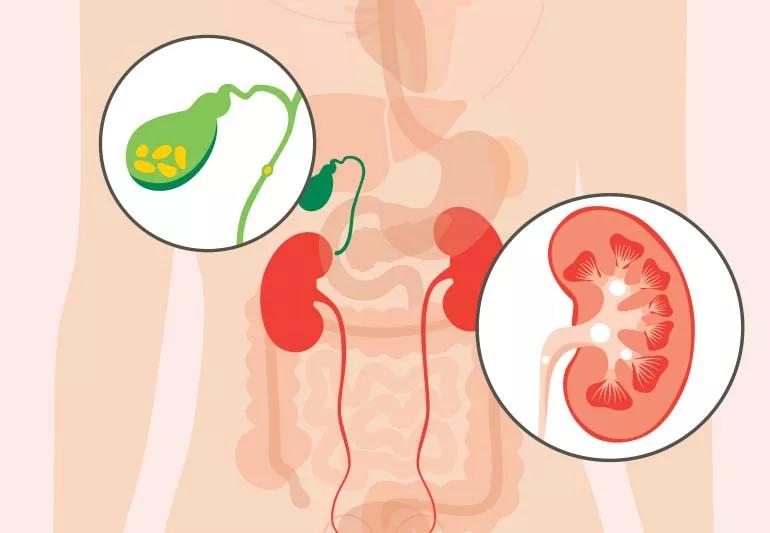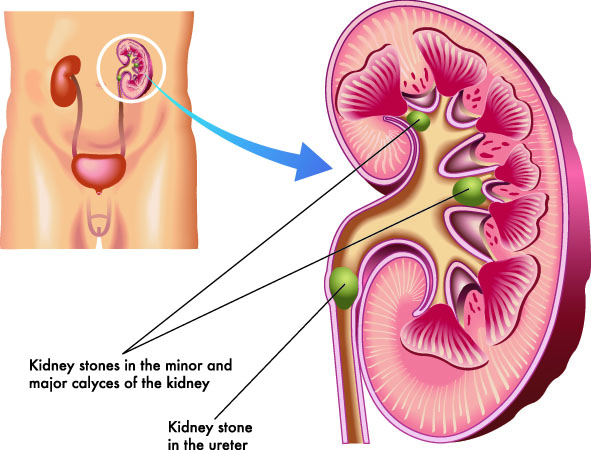Checking Out the Symptoms and Causes of Kidney Stones in Comparison to Urinary System Tract Infections: An In-depth Overview
The exploration of kidney rocks and urinary system system infections (UTIs) discloses a complicated interaction of signs and symptoms and underlying reasons that warrant cautious exam. While both conditions can result in hematuria, they offer distinct scientific attributes and arise from different etiological aspects. Understanding the nuances of each condition is critical for effective diagnosis and administration. What are the key differences in their signs, and just how might these educate therapy strategies? The answers to these concerns might give vital insights into the avoidance and treatment of these usual urological concerns.
Review of Kidney Stones
Kidney rocks, also understood as kidney calculi, type when particular materials in the pee crystallize and accumulation, resulting in the development of tough deposits within the kidneys. These stones can vary in dimension, varying from a grain of sand to a golf round, and can be composed of different products, one of the most common being calcium oxalate, uric acid, struvite, and cystine. The formation of kidney stones is influenced by a number of aspects, including dietary practices, fluid intake, and hereditary tendency.
Signs and symptoms of kidney stones might include serious discomfort in the back or side, blood in the pee, queasiness, and regular peeing, particularly as the stone moves through the urinary tract. Medical diagnosis commonly involves imaging researches such as ultrasound or CT scans, alongside urinalysis to determine the stone's structure.
Treatment options vary based upon the size and kind of rock, in addition to the seriousness of symptoms (Kidney Stones vs UTI). Little rocks might pass naturally with raised liquid intake, while larger rocks may require clinical interventions such as lithotripsy or surgical elimination. Comprehending the pathophysiology and danger factors related to kidney stones is important for effective avoidance and administration
Summary of Urinary System Tract Infections
Urinary system system infections (UTIs) prevail bacterial infections that affect any kind of component of the urinary system, including the kidneys, ureters, bladder, and urethra. They mainly take place when bacteria, often from the stomach tract, enter the urinary system, causing inflammation and infection. UTIs are categorized into 2 main kinds: difficult and straightforward. Uncomplicated UTIs typically occur in healthy people with normal urinary systems, while complicated UTIs may emerge in individuals with underlying conditions, such as architectural problems or compromised immune systems.
The prevalence of UTIs is significantly greater in females than guys, largely as a result of physiological differences, such as a shorter urethra. Risk factors include sex, specific contraceptive approaches, urinary retention, and dehydration. The medical diagnosis of UTIs is generally confirmed through urine tests, which may reveal the presence of microorganisms, white blood cells, or red cell.

Signs And Symptoms of Kidney Stones
The pain connected with kidney stones can manifest in numerous means, commonly leading individuals to seek clinical focus. One of the most common symptoms is extreme discomfort, usually localized in the reduced back or side, which might radiate to the abdominal area or groin. This discomfort, find more info frequently described as sharp or cramping, can take place all of a sudden and might change in intensity.
Furthermore, individuals may experience hematuria, or blood in the pee, which can range from tiny total up to visible staining. This click to find out more sign may be come with by modifications in urinary routines, such as enhanced regularity or seriousness, as well as pain during peeing. Nausea and throwing up are likewise prevalent, usually resulting from the body's response to intense discomfort.
Sometimes, individuals might experience high temperature and chills, specifically if an additional infection creates due to the obstruction created by the rocks. In general, the mix of extreme pain, hematuria, modified urinary system patterns, and stomach symptoms can supply substantial insight into the existence of kidney rocks, necessitating prompt medical examination and treatment. Recognizing these symptoms is important for prompt medical diagnosis and reliable management of the condition.
Signs of Urinary System System Infections
Infections within the urinary system system usually present a series of distinctive signs that can substantially affect life. One of the most usual signs and symptoms consist of a relentless impulse to pee, often accompanied by a burning sensation during peeing, called dysuria. People might additionally experience raised regularity of peeing, creating little amounts of urine each time.
Other notable symptoms consist of fetid or link gloomy urine, which may indicate the visibility of microorganisms or pus. In some instances, pee might appear red or pink as a result of the visibility of blood, a condition called hematuria. Additionally, people might experience pelvic discomfort or pressure, which can better worsen the sensation of urgency.
Systemic symptoms might likewise manifest, such as high temperature, cools, and fatigue, especially if the infection has actually ascended to the kidneys. It is necessary to identify these signs and symptoms early, as neglected urinary system infections can cause much more severe issues. Kidney Stones vs UTI. Trigger clinical interest is advised when these signs and symptoms are observed, permitting appropriate diagnostic examination and therapy to relieve discomfort and prevent additional health concerns
Reasons For Each Problem
Frequently, kidney stones and urinary system system infections occur from distinctive yet sometimes overlapping causes that can impact people differently. Dehydration, insufficient fluid consumption, and high-sodium diet regimens can exacerbate these conditions, promoting condensation within the urinary system system.

Recognizing these distinctive reasons is important for prevention and treatment. Kidney Stones vs UTI. While lifestyle alterations might alleviate the danger of kidney stones, ideal hygiene and prompt therapy of urinary system tract infections are vital for reducing their recurrence and linked issues
Conclusion
In recap, kidney stones and urinary system tract infections present distinctive signs and underlying reasons. Kidney stones are defined by extreme pain and metabolic variables, while urinary tract infections largely involve microbial infections leading to urinary necessity and discomfort.
The exploration of kidney rocks and urinary tract infections (UTIs) exposes a complex interplay of signs and underlying reasons that require cautious exam.Urinary tract infections (UTIs) are typical microbial infections that impact any kind of part of the urinary system, including the kidneys, ureters, bladder, and urethra.Frequently, kidney stones and urinary system system infections arise from unique yet occasionally overlapping reasons that can affect individuals in a different way.In recap, kidney rocks and urinary tract infections existing distinctive signs and symptoms and underlying causes. Kidney stones are defined by serious discomfort and metabolic aspects, while urinary system system infections primarily involve bacterial infections leading to urinary urgency and discomfort.
Comments on “Kidney Stones vs UTI: Important Info on Treatment Options and Prevention”